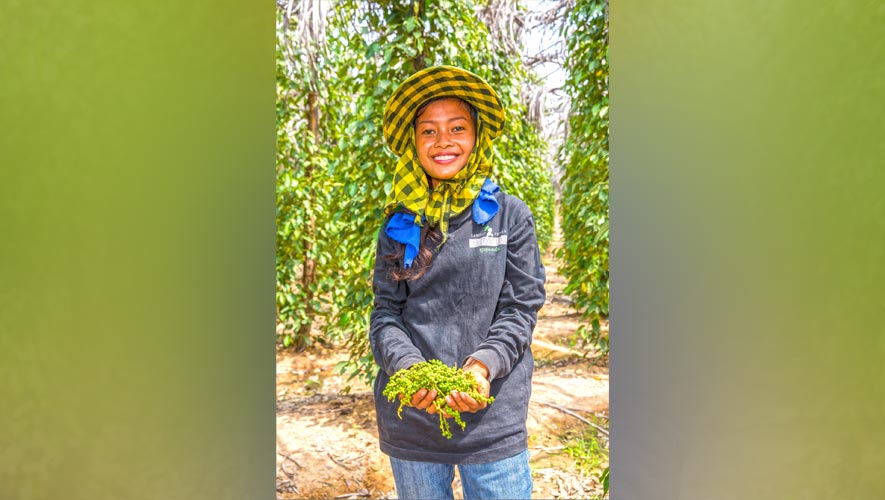Kampot Pepper: rising demand, over-supply and climate change
For the latest Cambodian Business news, visit Khmer Times Business
It is known as one of Cambodia’s finest products and has, accordingly, received international certifications.
Kampot Pepper is regarded as one of the country’s top Protected Geographical Indication (PGI) products. A PGI is a sign used on products that have a specific geographical origin and possess qualities or a reputation that are only from that place.
There are two pepper markets in Cambodia. According to Nathalie Chaboche and Guy Porre, owners of La Plantation Kampot.
Other Cambodian black peppers are grown and produced in Memot, Kampong Cham, Mondolkiri and other provinces near the Vietnam border.
This pepper is mainly sold to Vietnamese collectors and importers.
Kampot Pepper, however, grows exclusively in some districts of Kampot province. This pepper was recognised as a PGI in 2010 in Cambodia and in 2016 in Europe.
The province’s exclusive produce has been recognised by the culinary community around the world as the best pepper globally because it benefits from exceptional climate and soil conditions and is grown with natural fertilisers and pesticides.
The flagship product of Kampot is the Red Kampot Pepper: red peppercorns that are selected by hand when fully ripe and blanched and sun dried. La Plantation has also created an exclusive product, known as the Salted Kampot Product, which involves a unique salt fermentation process that maintains a lifespan of fresh green peppercorns of two years.
Rising demand
“Since 2005 and the since the PGI accreditation in 2010, we call it the ‘Revival of Kampot Pepper’. The production of Kampot Pepper is growing year after year reaching around 100 tonnes in 2019,” says Chaboche.
The Kampot Pepper producer also adds that La Plantation has produced almost 22 tonnes of Kampot Pepper this year, indicating there is a high demand for it.
“The quality of our production is our best-selling factor. We control the whole processing of our products from the farming to the packaging,” says Chaboche. She adds that the company has the only integrated chain of production in the region, with high standards in terms of hygiene and food safety.
However, the Kampot Pepper Promotion Association (KPPA) President Nguon Lay reported that the Kampot Pepper sector is under pressure because over-cultivation is driving farmers to give up production. Production numbers have continued to increase despite the volume of orders remaining the same. This has resulted in an oversupply of crop.
The association controls the producers, the packagers who have to follow the specification book of the PGI. They also work closely with the farmers in order to control the quality and quantity of production.
According to Mr Lay, production this year saw the numbers reach 90 tonnes of Kampot Organic Pepper. 50 tonnes were sold to exporters while 40 more tonnes are seeking new markets because of the oversupply. Lay says the average demand is usually 70 tonnes.
2017 saw the production of 102 tonnes, which dropped to 70 tonnes in 2018. This year supply rose to 90 tonnes.
“The association is currently selling 50 percent of the produce to the European Union with another 10 percent to the United States and 10 percent to countries in Asia including Japan, Korea, Taiwan and Hong Kong,” says Lay.
The rest of the produce is sold for local consumption and tourists in places such as Kampot, Sihanoukville, Siem Reap, Battambang and Kep.
Chaboche also notes that the demand for certified organic pepper is growing in Europe. La Plantation has been acknowledged as a certified organic farm by Ecocert France since 2016.
Other problems
One of the looming challenges the sector still faces is the fight against pepper falsely labelled as being from Kampot. There are cases where counterfeit peppers are sold as Kampot Pepper. Lay says the concern over these peppers are often combated when the products are to be exported to Europe because exporters would have present a certificate to the Ministry of Commerce and Ministry of Agriculture. Those without the Sanitary and Phytosanitary (SPS) certification will not be able to send them abroad.
The certificate aims to protect the Kampot Pepper brand.
KPPA collaborates with the Ministry of Commerce to control the export of Kampot Pepper with a Certificate of Conformity.
Companies involved in selling Kampot pepper would still have to purchase a certain amount of the produce from farmers despite owning their own farms.
Chaboche of La Plantation also notes that one of the main challenges for Kampot Pepper production is climate change. While rain is an important factor in getting high volumes of pepper production, too much rain can rot the roots. Therefore the plant needs a huge maintenance team.
The crop’s future
“We expect to keep the reputation and the exception quality of Kampot Pepper. As a maker producer, we have also decided to support the small farmers who have difficulties to reach international markets,” says Chaboche. La plantation buys produce from other farmers at a higher price than the overall market.




